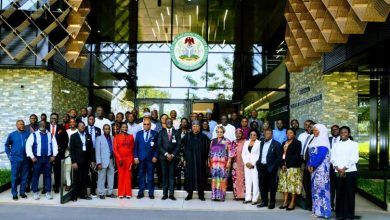GBV: NSCDC Launches Club In Schools To End Societal Ill

The Nigeria Security and Civil Defence Corps (NSCDC) has launched a, Say NO to Sexual, Gender Based Violence (SGBV) club across schools in Nigeria.
NSCDC Commandant General (CG), Ahmed Audi, inaugurated the club during a maiden National Women’s Conference, themed “Enhancing Capacity and Mainstreaming Gender Effectively within and beyond the Workplace” on Tuesday at the Corps headquarters in Abuja.
A Statement by Babawale Afolabi, the National PRO, NSCDC Headquarters notes that move aims to educate students on gender equality.
The CG, Audi said that because education plays a pivotal role in shaping perspectives, by launching the SGBV Club in schools, the Federal Government was taking a crucial step towards fostering a culture of respect, understanding, and empathy.
“The SGBV club is not just an initiative but a movement so our schools must become spaces where young minds are nurtured to reject violence, discrimination, and inequality.
“It is a collective effort to educate, empower, and create a generation that will stand against any form of gender-based violence which means through education and awareness we can dismantle stereotypes.
“Also, eradicate the norms that perpetuate violence thereby build a society where every woman and girl, men and boy can live without fear,” he said.
The CG said that it was a must to recognize that the empowerment of women was not just a moral imperative but a strategic one to enhance capacity, not just within the workplace but in every sphere of life.
“The contributions of women to our societies, economies, and cultures are immeasurable, and it is in our collective interest to ensure that every woman has the opportunity to thrive.
“It is important to acknowledge the challenges that persist and to chart a course towards a future where every individual, regardless of gender, can realize their full potential.
“The struggle for gender equality is not a battle of women against men, each one of us, regardless of gender, has a role to play in dismantling the barriers that limit the potential of half of our population,” Audi said.
According to the Secretary to the Government of the Federation (SGF), Sen. George Akume, women and girls are not to be described as the only victims of SGBV, adding that men and boys had equally been victims of such nefarious practices.
Senior Special Assistant on Technical duties to the SGF, Prof. Bolaji Babatunde, however said that women were more disproportionately at risk of exposure to the social menace compared to their male counterparts.
He said that the Federal Government Sustainable Development Goals (SDGs) emphasised the need to promote gender equality and women empowerment at which he emphasised that for this to be achieved, women must be seen as people in their rights rather than as objects of exploitation, marginalization, or abuse.
“In all spheres of their endeavour, women are exposed to SGBV, which is fast becoming a norm in different parts of Nigeria and attempts by women who are victims of SGBV to cry out are constantly silenced.
“Silenced by racial, cultural, religious undertone or even direct oppositions, such that they are often tagged as disrespectful or anti-cultural,” he decried.
He called for the need to increase funding and prioritise training of security agencies in order to position them to effectively combat the menace of SGBV in schools and workplaces.
“There is the need to develop proper accountability frameworks for budgeting processes and take cognizance of cross-cutting issues like capacity training of key stakeholders, legislative and policy reviews as well as the establishment of mechanisms that ensure implementation and monitoring of duties,” he said.
In her welcome address, NSCDC Gender Desk Head, Assistant Commandant of Corp (ACC) Ajet Kemi, said that the introduction of this clubs will serve as a beacon of awareness, education and support.
Mrs Kemi further said that the club will empower students to stand up against SGBV thereby fostering a culture of respect, empathy, and accountability within Nigeria’s educational institutions.
“By addressing these issues at their roots, we are sowing the seeds for a future where our youth can pursue their education unencumbered by the shadows of violence.
“Let us keep in mind the urgency of our shared mission, the empowerment of women and the eradication of SGBV are not isolated objectives but interconnected pillars in our vision for a more just and equitable society.
“We are embarking on this journey to explore how they can enhance the capacity of women within their professional spheres and extend that impact far beyond the workplace, influencing every facet of our society,” she said.





